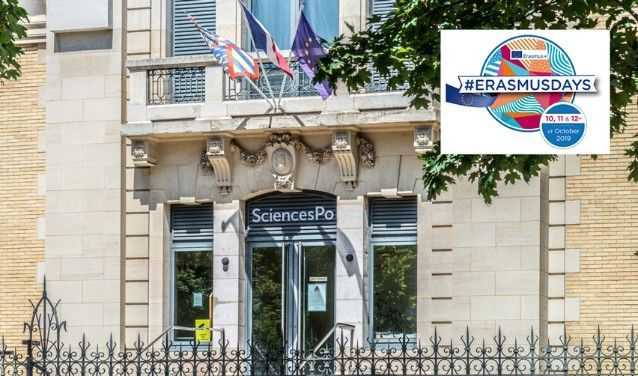Home>Erasmus Days: Sciences Po in Europe and beyond

09.10.2019
Erasmus Days: Sciences Po in Europe and beyond
This year, 512 Sciences Po students participated in an Erasmus+ programme, while 650 students came to the university for their Erasmus+ in 2018-2019. Sciences Po not only actively participates in Erasmus+ programmes by sending and receiving large numbers of students each year, but also takes part in a multitude of initiatives to build a stronger and more unified Europe in terms of education and mobility.
Three of the undergraduate campuses (Dijon, Nancy and Poitiers) have a specific academic focus on Europe, while students on the remaining campuses are familiarised with the region. At the master’s level, the European Affairs programme offers students the opportunity to deepen their political understanding of the continent. To this end, Sciences Po has also established numerous dual degrees with European partner universities, while maintaining over 150 partnerships for student exchanges. European research is also important, and there exist research collaborations with Oxford University (OXPO), Cambridge University (Cambridge-Sciences Po Research Cooperation Framework) and the Max Planck Institute for the Study of Societies (MaxPo), along with programmes for faculty mobility and Sciences Po’s very own Centre for European Studies (CEE).
Furthermore, in June 2019 the European Commission listed the laureates of European Universities that would create CIVICA, a pioneering initiative that truly reflects the European trajectory of our university and our international ambitions for the role of the social sciences in the world today. CIVICA, The European University of the Social Sciences, is a union coordinated by Sciences Po that is comprised of Bocconi University (Italy), Central European University (Hungary), European University Institute (European intergovernmental organisation), Hertie School of Governance (Germany), National University of Political Studies and Public Administration (Romania), Sciences Po (France) and Stockholm School of Economics (Sweden). The London School of Economics and Political Science (United Kingdom) is also an associate partner.
As the name suggests, CIVICA will be tasked with finding solutions to the major socio-political questions of today. To pursue its ambition, CIVICA’s different actors shall work in Trans-European teams, keeping the promotion of civic values a priority, and work on topics concerning the state of democracy, the transitions of societies worldwide, the evolution of the European continent and the role of technology and data, to name a few. Thus, Sciences Po and its partners are going one step further than the Erasmus mobility schemes and creating a template for the future, in their desire to truly Europeanise education and set a global example.
More information